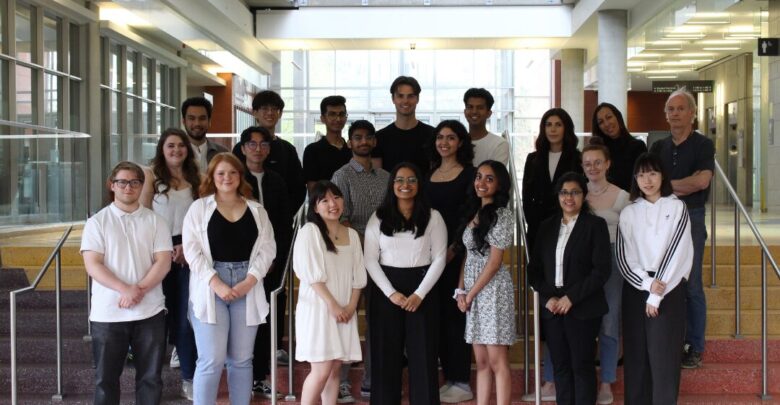 Supplied
SuppliedOn November 5, a University of Alberta iGem team won a silver medal at the 2023 Grand Jamboree in Paris, France. iGem is an organization that is devoted to the advancement of synthetic biology through education and competition.
Six representatives from the U of A team attended this competition in early November. The team consisted of five undergraduate students and one advisor, Marina Lazic, an assistant lecturer in the faculty of science. The team won the medal with their Fungal Early Detection Drone System (FEDDS).
Rachael Rieberger, the administrator and lab technician for the team, describes the project as “a fungal pathogen detection system [that uses] fluorescent proteins.”
Combining biology with technology, the team developed a synthetic protein that will react and emit a red glow when the pathogen fusarium is present. Fusarium is harmful because its presence can result in reduced grain yield and contamination with mycotoxins. Mycotoxins can have impacts on both human and animal health. The director of technology, Neel Patel, explained that drones then use image processing to detect whether or not fusarium is present, noting the coordinates if it is.
However, iGem is not exclusively about science. Teams are also encouraged to incorporate human practices into the development of their projects. iGem asks every team to think if their project is responsible and good for humanity.
“iGem isn’t just about the lab and temp work. It’s about human practices as well. We did two realms of that. We focused heavily on education … and we also did integrated human practices,” Nina Deschner, director of laboratory, said.
The iGem team overcame lack of supports to win silver medal, team says
Although this team successfully won a silver medal, they faced many challenges along the way.
“[When we won] a big burden was removed from my heart because we [started] from nothing. It’s important for people to know that nobody really wanted to help,” Lazic said.
“I think [because of] the fact that we were able to overcome [the lack of support], it was a really vindicating moment for us,” Deschner said.
In addition to the lack of support, funding was a large issue for this group.
“Our main challenge was getting funding and fundraising … because it’s a very expensive competition. There’s a lot of fees associated with it … [as well as] the cost for developing our project,” Rieberger said.
Lazic pushed for resources from the faculty of science, but didn’t receive much support. However, Frederick West, a professor in the faculty of science, was supportive of the project. As well, Anthony Cornish, as a part of the Molecular Biology Facility (MBSU), donated free sequencing.
Luckily for the team, “the point of iGem is not to have a fully fledged project at the end but to show that you made a commitment, made developments, and [laid] the foundation for your project,” Deschner said.
Silver medal provides a solid foundation for future U of A iGem teams, Deschner says
Despite this team’s triumph, previous U of A teams were not able to find much success during or after the COVID-19 pandemic.
“[It’s] really important that we established a foundation for iGem at the university again. It connects countries, students, and communities from all over the world to make a difference,” Deschner said.
The experience of attending the competition was extremely exciting for all five undergraduate students. “It was so cool to see other aspects of what people were working on and the other side of iGem,” Soren Skaret, lab technician and admin assistant, said.
“It was a good eye opener to see how different universities in different places of the world operate and [to see their] problems and what their solutions are,” Patel said.
Lazic pushing for the U of A to offer an iGem course
The next step for this project include testing the product in a controlled environment. However, this project is “open source.” This means that “for the drone portion, anyone, anywhere can work on [it],” Patel said.
The U of A iGem team does have the option to continue the project. As well, they intend to expand on the human practices aspects. Skaret thinks that the feedback from farmers and agricultural experts could be valuable in developing the project further and making it “more useful and accessible to the people who would actually be using it.”
Lazic is also pushing for the implementation of an iGem course at the university. In this course, students would be part of a team that develops a project of their choice.
“Synthetic biology is extremely important for our future. We see what’s happening with the world. [There are] so many problems that are originating because people are not exploiting the amazing possibilities of synthetic biology.”




